The Global Knowledge Value Chain on Sustainability: Addressing Fragmentations through International Academic Partnerships
Abstract
:1. Introduction
2. Data and Methods
3. State of the Art and Conceptual Framework
3.1. Sustainability and Internationalization in Higher Education
3.2. The Global Knowledge Value Chain on Sustainability and Its Fragmentations
4. Empirical Explorations on the Fragmentations of the Global Knowledge Value Chain on Sustainability
4.1. Disciplinary Fragmentation: The Neglect of “Brown Issues”
4.2. The Spatial Fragmentation of Knowledge: Evidence from the Andes
5. Addressing Fragmentations: The Role of International Academic Partnerships
5.1. trAndeS: Social Inequalities and Sustainable Development in the Andes
5.2. Bridging Disciplinary Boundaries in Research and Teaching on Social Inequalities and Sustainability
5.3. Adressing Spatial Knowledge Fragmentations: A Hub and a Twodimensional Network
6. Final Reflections
Author Contributions
Funding
Institutional Review Board Statement
Informed Consent Statement
Acknowledgments
Conflicts of Interest
References and note
- Kahle, J.; Risch, K.; Wanke, A.; Lang, D. Strategic Networking for Sustainability: Lessons Learned from Two Case Studies in Higher Education. Sustainability 2018, 10, 4646. [Google Scholar] [CrossRef] [Green Version]
- Caniglia, G.; Luederitz, C.; Groß, M.; Muhr, M.; John, B.; Withycombe Keeler, L.; von Wehrden, H.; Laubichler, M.; Wiek, A.; Lang, D. Transnational Collaboration for Sustainability in Higher Education: Lessons from a Systematic Review. J. Clean. Prod. 2017, 168, 764–779. [Google Scholar] [CrossRef]
- Karatzoglou, B. An in-depth literature review of the evolving roles and contributions of universities to education for sustainable development. J. Clean. Prod. 2013, 49, 44–53. [Google Scholar] [CrossRef]
- Leal Filho, W.; Will, M.; Shiel, C.; Paço, A.; Farinha, C.S.; Orlovic Lovren, V.; Avila, L.V.; Platje, J.; Sharifi, A.; Vasconcelos, C.R.P.; et al. Towards a Common Future: Revising the Evolution of University-Based Sustainability Research Literature. Int. J. Sustain. Dev. World Ecol. 2021, 503–517. [Google Scholar] [CrossRef]
- Leal Filho, W.; Salvia, A.L.; Pretorius, R.W.; Brandli, L.L.; Manolas, E.; Alves, F.; Azeiteiro, U.; Rogers, J.; Shiel, C.; Do Paco, A. (Eds.) Universities as Living Labs for Sustainable Development: Supporting the Implementation of the Sustainable Development Goals; Springer International: Berlin/Heidelberg, Germany, 2020. [Google Scholar]
- Leal Filho, W.; Shiel, C.; Paço, A.; Mifsud, M.; Ávila, L.V.; Brandli, L.L.; Molthan-Hill, P.; Pace, P.; Azeiteiro, U.M.; Vargas, V.R.; et al. Sustainable Development Goals and Sustainability Teaching at Universities: Falling behind or Getting Ahead of the Pack? J. Clean. Prod. 2019, 232, 285–294. [Google Scholar] [CrossRef] [Green Version]
- Wiek, A.; Withycombe, L.; Redman, C.L. Key Competencies in Sustainability: A Reference Framework for Academic Program Development. Sustain. Sci. 2011, 6, 203–218. [Google Scholar] [CrossRef] [Green Version]
- Lozano, R. A Tool for a Graphical Assessment of Sustainability in Universities (GASU). J. Clean. Prod. 2006, 14, 963–972. [Google Scholar] [CrossRef]
- Veiga Ávila, L.; Beuron, T.A.; Brandli, L.L.; Damke, L.I.; Pereira, R.S.; Klein, L.L. Barriers to Innovation and Sustainability in Universities: An International Comparison. Int. J. Sustain. High. Educ. 2019, 20, 805–821. [Google Scholar] [CrossRef]
- Akins, E.; Giddens, E.; Glassmeyer, D.; Gruss, A.; Kalamas Hedden, M.; Slinger-Friedman, V.; Weand, M. Sustainability Education and Organizational Change: A Critical Case Study of Barriers and Change Drivers at a Higher Education Institution. Sustainability 2019, 11, 501. [Google Scholar] [CrossRef] [Green Version]
- Wals, A. Sustainability in higher education in the context of the UN DESD: A review of learning and institutionalization processes. J. Clean. Prod. 2014, 62, 8–15. [Google Scholar] [CrossRef]
- Lozano, R.; Lukman, R.; Lozano, F.J.; Huisingh, D.; Lambrechts, W. Declarations for Sustainability in Higher Education: Becoming Better Leaders, through Addressing the University System. J. Clean. Prod. 2011, 48, 10–19. [Google Scholar] [CrossRef]
- Hopff, B.; Nijhuis, S.; Verhoef, L.A. New Dimensions for Circularity on Campus—Framework for the Application of Circular Principles in Campus Development. Sustainability 2019, 11, 627. [Google Scholar] [CrossRef] [Green Version]
- Velazquez, L.; Munguia, N.; Platt, A.; Taddei, J. Sustainable University: What Can Be the Matter? J. Clean. Prod. 2006, 14, 810–819. [Google Scholar] [CrossRef]
- Zilahy, G.; Huisingh, D.; Melanen, M.; Phillips, V.D.; Sheffy, J. Roles of Academia in Regional Sustainability Initiatives: Outreach for a More Sustainable Future. J. Clean. Prod. 2009, 17, 1053–1056. [Google Scholar] [CrossRef]
- Pundt, H.; Heilmann, A. Building Collaborative Partnerships: An Example of a 3rd Mission Activity in the Field of Local Climate Change Adaptation. In Universities as Living Labs for Sustainable Development: Supporting the Implementation of the Sustainable Development Goals; Leal Filho, W., Salvia, A.L., Pretorius, R.W., Brandli, L.L., Manolas, E., Alves, F., Azeiteiro, U., Rogers, J., Shiel, C., Do Paco, A., Eds.; Springer International Publishing: Cham, Switzerland, 2020; pp. 621–636. [Google Scholar] [CrossRef]
- Withycombe, L.; Beaudoin, F.; Lerner, A.; John, B.; Beecroft, R.; Tamm, K.; Wiek, A.; Lang, D. Transferring Sustainability Solutions across Contexts through City–University Partnerships. Sustainability 2018, 10, 2966. [Google Scholar] [CrossRef] [Green Version]
- Radinger-Peer, V.; Pflitsch, G. The Role of Higher Education Institutions in Regional Transition Paths Towards Sustainability. Rev. Reg. Res. 2017, 37, 161–187. [Google Scholar] [CrossRef]
- Withycombe, L.; Wiek, A.; Lang, D.J.; Yokohari, M.; van Breda, J.; Olsson, L.; Ness, B.; Morato, J.; Segalàs, J.; Martens, P.; et al. Utilizing International Networks for Accelerating Research and Learning in Transformational Sustainability Science. Sustain. Sci. 2016, 11, 749–762. [Google Scholar] [CrossRef] [Green Version]
- Berchin, I.I.; Sima, M.; de Lima, M.A.; Biesel, S.; dos Santos, L.P.; Ferreira, R.V.; de Andrade Guerra, J.B.S.O.; Ceci, F. The Importance of International Conferences on Sustainable Development as Higher Education Institutions’ Strategies to Promote Sustainability: A Case Study in Brazil. J. Clean. Prod. 2018, 171, 756–772. [Google Scholar] [CrossRef]
- Jelin, E.; Motta, R.; Costa, S. (Eds.) Global Entangled Inequalities: Conceptual Debates and Evidence from Latin America; Taylor and Francis: London, UK, 2017. [Google Scholar]
- United Nations Development Programme (UNDP). Human Development Report: Sustainability and Equity: A Better Future for All; United Nations Development Programme (UNDP): New York, NY, USA, 2011; Available online: http://hdr.undp.org/sites/default/files/hdr_2011_en_summary.pdf (accessed on 25 February 2021).
- Chancel, L.; Piketty, T. Carbon and Inequality: From Kyoto to Paris—Trends in the Global Inequality of Carbon Emissions (1998–2013) & Prospects for an Equitable Adaption Fund; Paris School of Economics: Paris, France, 2015. [Google Scholar]
- Göbel, B.; Góngora Mera, M.E.; Ulloa Cubillos, A. (Eds.) Desigualdades Socioambientales en América Latina; Universidad Nacional de Colombia: Bogotá, Colombia; Ibero-Amerikanisches Institut: Berlin, Germany, 2014. [Google Scholar]
- Ströbele-Gregor, J. Lithium in Bolivien: Das Staatliche Lithium-Programm, Szenarien Sozio-Ökologischer Konflikte und Dimensionen Sozialer Ungleichheit; desiguALdades.net Working Paper Series No. 13; desiguALdades.net International Research Network on Interdependent Inequalities in Latin America: Berlin, Germany, 2012; Available online: https://www.desigualdades.net/Resources/Working_Paper/13_WP_Str_bel_Gregor_online_dt.pdf (accessed on 16 February 2021).
- Dietz, K.; Prause, L. Die sozial-ökologischen Folgen der E-Mobilität. Konflikte um den Rohstoffabbau im Globalen Süden. In Baustelle Elektromobilität: Sozialwissenschaftliche Perspektiven auf die Transformation der (Auto-) Mobilität; Brunnengräber, A., Haas, T., Eds.; Transcript Verlag: Bielefeld, Germany, 2020; pp. 329–354, Similar situations can be found in the cases of copper and cobalt mining. [Google Scholar]
- Plank, L.; Staritz, C. Introduction: Global Commodity Chains and Production Networks—Understanding Uneven Development in the Global Economy. J. Entwickl. 2009, 25, 4–19. [Google Scholar] [CrossRef] [Green Version]
- Kaplinsky, R. Globalization, Poverty and Inequality; Polity Press: Cambridge, UK, 2005. [Google Scholar]
- Bridge, G. Global Production Networks and the Extractive Sector: Governing Resource-based Development. J. Econ. Geo. 2008, 8, 289–419. [Google Scholar] [CrossRef]
- Bustos Gallardo, B.; Prieto, M.; Barton, J. Ecología Política en Chile: Naturaleza, Propiedad, Conocimiento y Poder; Edicion Universitaria: Santiago, Chile, 2015. [Google Scholar]
- Bebbington, A.; Humphreys Bebbington, D.; Bury, J.; Lingan, J.; Muñoz, J.P.; Scurrah, M. Mining and Social Movements: Struggles Over Livelihood and Rural Territorial Development in the Andes. World Dev. 2008, 36, 2888–2905. [Google Scholar] [CrossRef]
- Damonte, G.; Boelens, R. Hydrosocial Territories, Agro-export and Water Scarcity: Capitalist Territorial Transformations and Water Governance in Peru’s Coastal Valleys. Water Int. 2019, 44, 206–223. [Google Scholar] [CrossRef]
- Damonte, G.; Dominguez, I.; Muñoz, I.; Oré, M.T. Escasez de agua en la cuenca del río Ica y el Alto Pampas en Huancavelica: Un intento de mirada interdisciplinaria. In Aguas en Disputa: Ica y Huancavelica Entre el Entrampamiento y el Diálogo; Oré, M.T., Muñoz, I., Eds.; Fondo Editorial, Pontificia Universidad Católica del Perú: Lima, Peru, 2018; pp. 47–74. [Google Scholar]
- Castillo, M. Socio-Ecological Inequality and Water Crisis: Views of Indigenous Communities in the Alto Loa Area. Environ. Justice 2016, 9, 9–14. [Google Scholar] [CrossRef]
- Bebbington, A.; Bury, J. Subterranean Struggles: New Dynamics of Mining, Oil, and Gas in Latin America; University of Texas Press: Austin, TX, USA, 2013. [Google Scholar]
- Paredes, M. La Transnacionalización de la Resistencia a la Minería en Tambogrande y Pascua Lama. Am. Lat. Hoy 2019, 80, 73–94. [Google Scholar] [CrossRef] [Green Version]
- Paredes, M. Conflictos mineros en el Perú: Entre la protesta y la negociación. Debates Sociología 2019, 5–32. [Google Scholar] [CrossRef]
- Schorr, B. Oportunidades desiguales: Empresas y Estado en conflictos sobre la minería en Chile. Estud. Atacameños 2018, 239–255. [Google Scholar] [CrossRef] [Green Version]
- Dietz, K.; Engels, B. Contested Extractivism, Society and the State: An Introduction. In Contested Extractivism, Society and the State: Struggles over Mining and Land; Engels, B., Dietz, K., Eds.; Palgrave Macmillan UK: London, UK, 2017; pp. 1–19. [Google Scholar]
- Magrach, A.; Sanz, M.J. Environmental and Social Consequences of the Increase in the Demand for ‘Superfoods’ World-wide. People Nat. 2020, 2, 267–278. [Google Scholar] [CrossRef]
- Sommaruga, R.; Eldridge, H.M. Avocado Production: Water Footprint and Socio-economic Implications. EuroChoices 2021. [Google Scholar] [CrossRef]
- McDonell, M. The Quinua Boom Goes Bust in the Andes, NACLA-Report on the Americas. 2018. Available online: https://nacla.org/news/2018/03/12/quinoa-boom-goes-bust-andes (accessed on 13 July 2021).
- Gereffi, G.; Fernandez-Stark, K. Global Value Chain Analysis: A Primer; Duke University: Durham, NC, USA, 2011; p. 4. [Google Scholar]
- Saliola, F.; Zanfei, A. Multinational Firms, Global Value Chains and the Organization of Knowledge Transfer. Res. Policy 2009, 38, 369–381. [Google Scholar] [CrossRef]
- Boström, M. A Missing Pillar? Challenges in Theorizing and Practicing Social Sustainability: Introduction to the Special Issue. Sustain. Sci. Pract. Policy 2012, 8, 3–14. [Google Scholar] [CrossRef] [Green Version]
- Boyer, R.; Peterson, N.; Arora, P.; Caldwell, K. Five Approaches to Social Sustainability and an Integrated Way Forward. Sustainability 2016, 8, 878. [Google Scholar] [CrossRef] [Green Version]
- Only recently, the literature on sustainability transitions has taken up the impact of these factors which are generally explored by the Social Sciences, see Köhler, J.; Geels, F.W.; Kern, F.; Markard, J.; Onsongo, E.; Wieczorek, A.; Alkemade, F.; Avelino, F.; Bergek, A.; Boons, F. An Agenda for Sustainability Transitions Research: State of the Art and Future Directions. Environ. Innov. Soc. Transit. 2019, 31, 1–32.
- Allouche, J.; Middleton, C.; Gyawali, D. Technical Veil, Hidden Politics: Interrogating the Power Linkages behind the Nexus. Water Altern. 2015, 8, 610–626. [Google Scholar]
- For the case of Latin America:; Orellana, V. Current Situation and Challenges of Higher Education in Latinamerica and the Caribbean, Notes Education and Development Post-2015; UNESCO: Santiago, Chile, 2014; Available online: http://www.unesco.org/new/fileadmin/MULTIMEDIA/FIELD/Santiago/pdf/APUNTE06-ENG.pdf (accessed on 13 July 2021).
- Hanauer, D.I.; Sheridan, C.L.; Englander, K. Linguistic Injustice in the Writing of Research Articles in English as a Second Language: Data from Taiwanese and Mexican Researchers. Writ. Commun. 2019, 36, 136–154. [Google Scholar] [CrossRef]
- Ammon, U. Linguistic Inequality and its Effects on Participation in Scientific Discourse and on Global Knowledge Accumulation: With a Closer Look at the Problems of the Second-rank Language Communities. Appl. Linguist. Rev. 2012, 3, 333–355. [Google Scholar] [CrossRef]
- Ferguson, G. The Global Spread of English, Scientific Communication and ESP: Questions of Equity, Access and Domain Loss. Ibérica 2007, 13, 7–38. [Google Scholar]
- Agyeman, J.; Bullard, R.D.; Evans, B. Exploring the Nexus: Bringing Together Sustainability, Environmental Justice and Equity. Space Polity 2002, 6, 77–90. [Google Scholar] [CrossRef]
- Fukuda-Parr, S. From the Millennium Development Goals to the Sustainable Development Goals: Shifts in Purpose, Concept, and Politics of Global Goal Setting for Development. Gend. Dev. 2016, 24, 43–52. [Google Scholar] [CrossRef]
- In This Line, Seven DAAD SDG Graduate Schools Are Funded, in Which German Universities Are Partnering with Universities in Latin America (Peru and Colombia), Asia (Vietnam) and Africa (Ethiopia, West Africa, Cameroon, South Africa). Available online: https://www.programa-trandes.net/en/SDG-Graduate-Schools/index.html (accessed on 23 June 2021).
- Schorr, B. How Social Inequality Affect Sustainable Development: Five Causal Mechanisms Underlying the Nexus; trAndeS Working Paper Series No. 1; Lateinamerika-Institut, Freie Universität Berlin: Berlin, Germany, 2018; Available online: https://www.programa-trandes.net/Ressources/working_papers/WP-1-Schorr-Online.pdf (accessed on 16 February 2021).
- Braig, M.; Costa, S.; Göbel, B. Social Inequalities and Global Interdependencies in Latin America: A Provisional Appraisal; desiguALdades.net Working Paper Series No. 100; desiguALdades.net International Research Network on Interdependent Inequalities: Berlin, Germany, 2016; Available online: https://refubium.fu-berlin.de/bitstream/handle/fub188/22070/WP-100-Braig-Costa-Goebel-Online.pdf?sequence=1&isAllowed=y (accessed on 16 February 2021).
- Dietz, K. Researching Inequalities from a Socio-ecological Perspective. In Global Entangled Inequalities: Conceptual Debates and Evidence from Latin America; Jelin, E., Motta, R., Costa, S., Eds.; Taylor and Francis: London, UK, 2017; pp. 76–92. [Google Scholar]
- trAndeS; University Alliance for Sustainability. Universities as Change Makers: Sustainability Initiatives from across the Globe; University Alliance for Sustainability; trAndeS—Postgraduate Program on Sustainable Development and Social Inequalities in the Andean Region: Berlin, Germany, 2020. [Google Scholar]
- Available online: https://www.programa-trandes.net/en/publication/index.html (accessed on 30 June 2021).
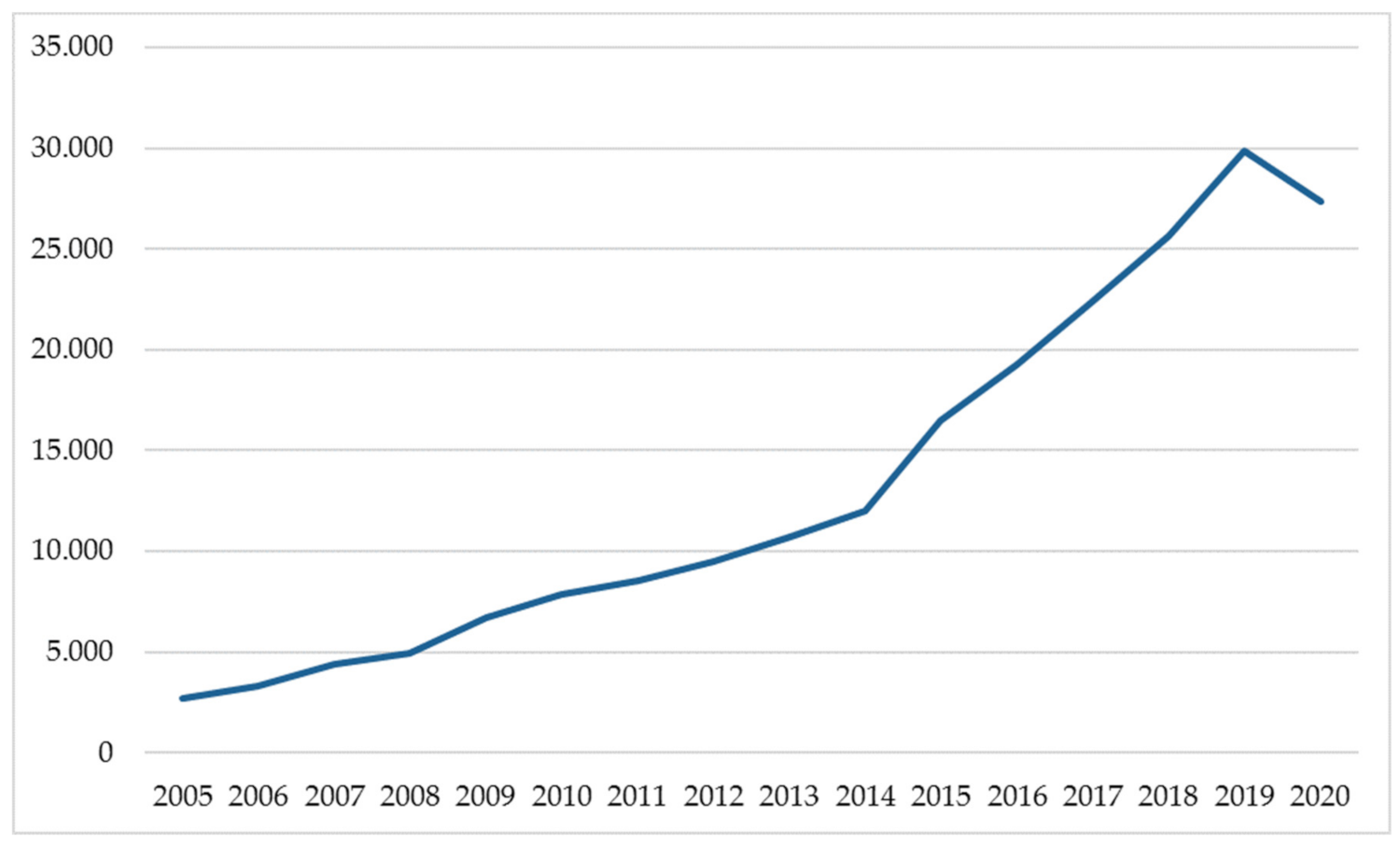
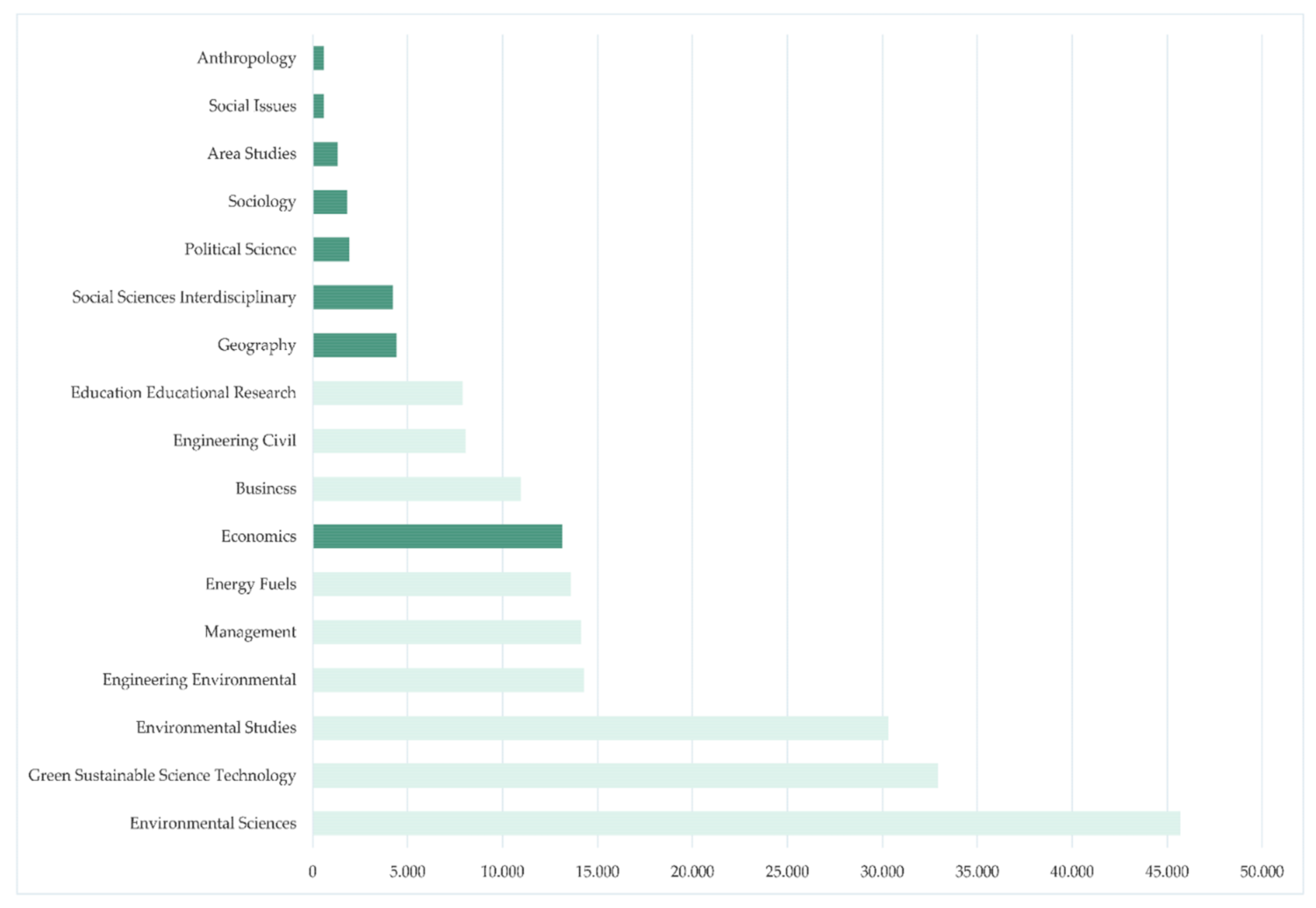
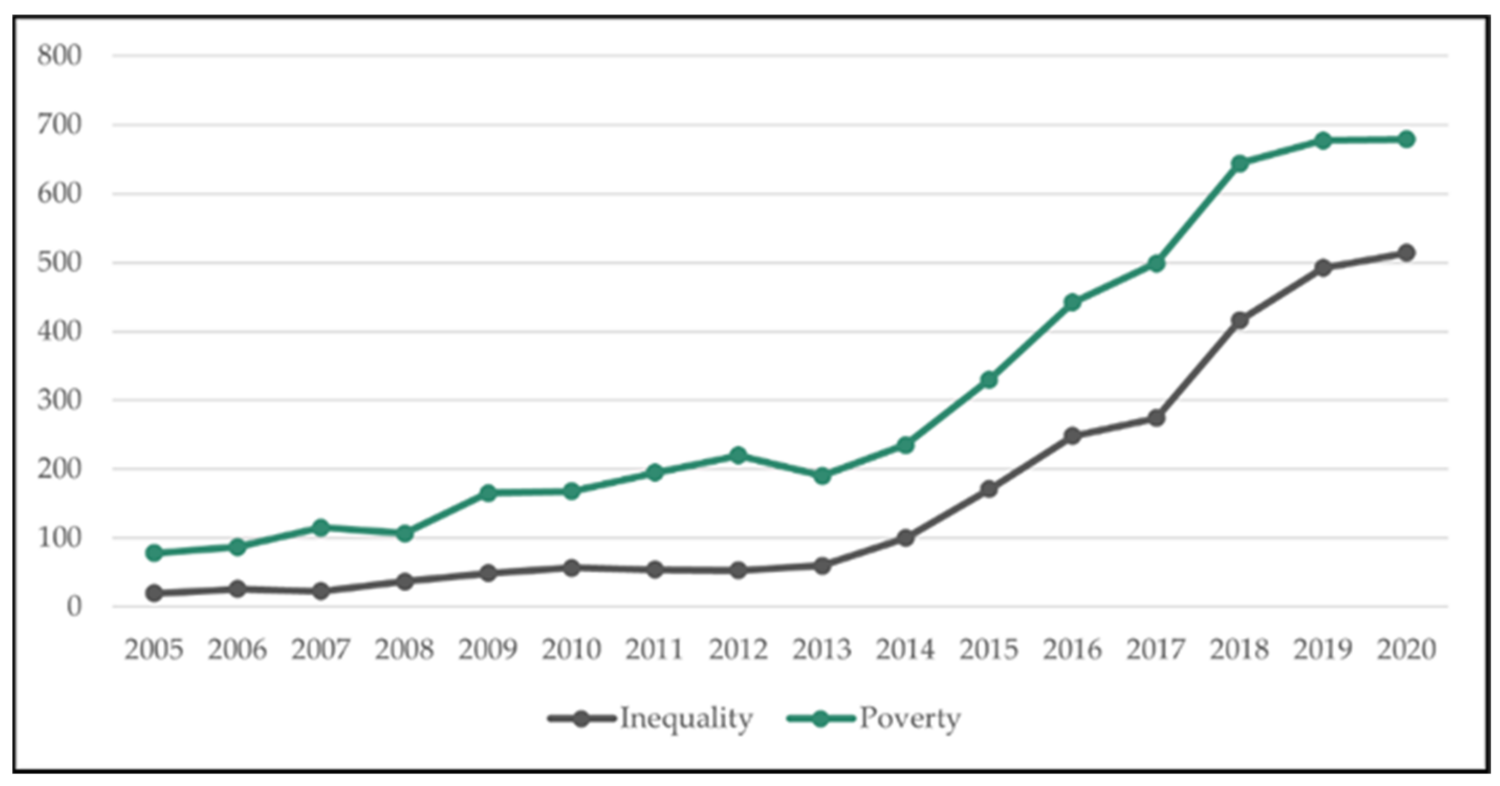
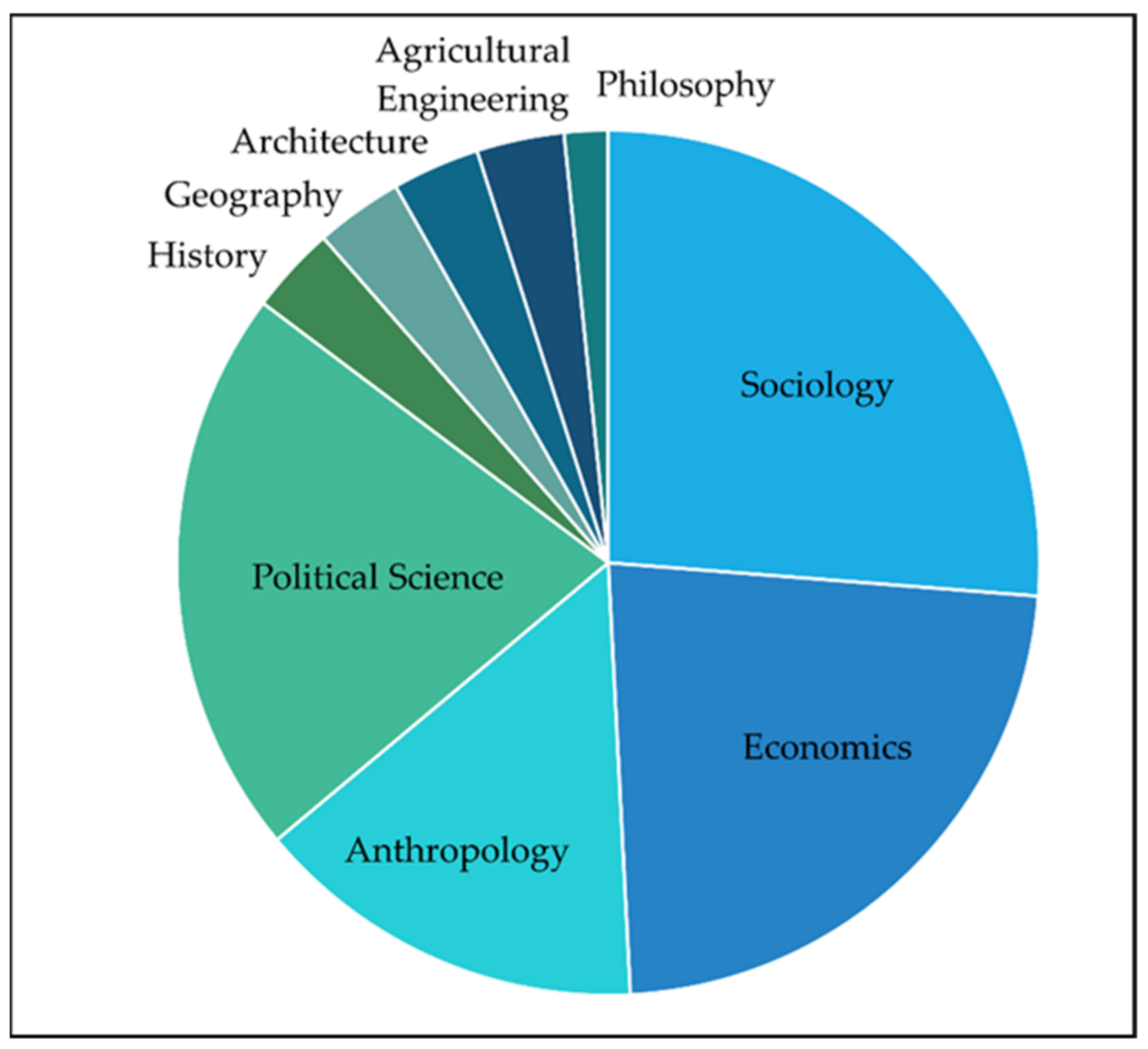
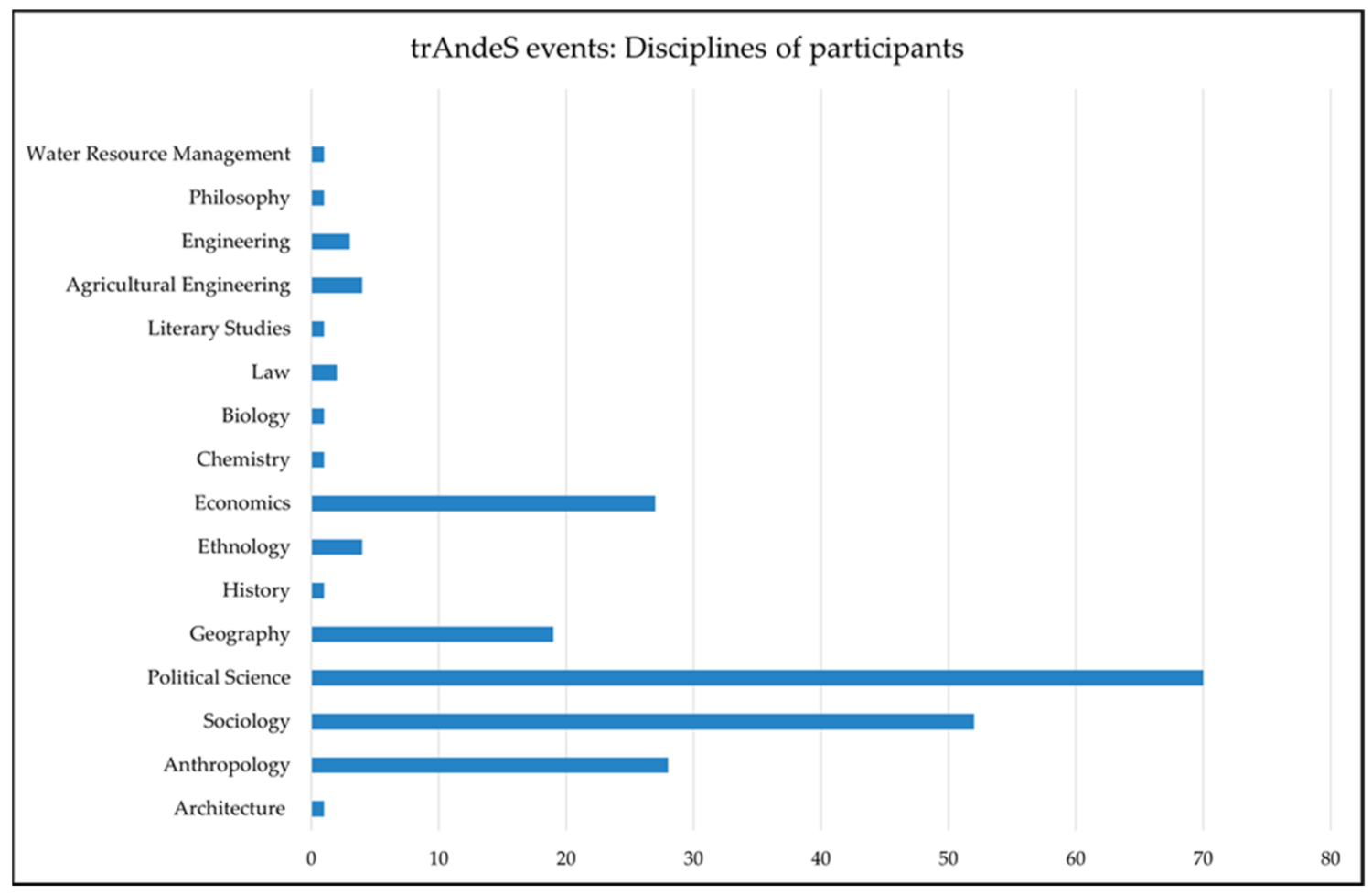
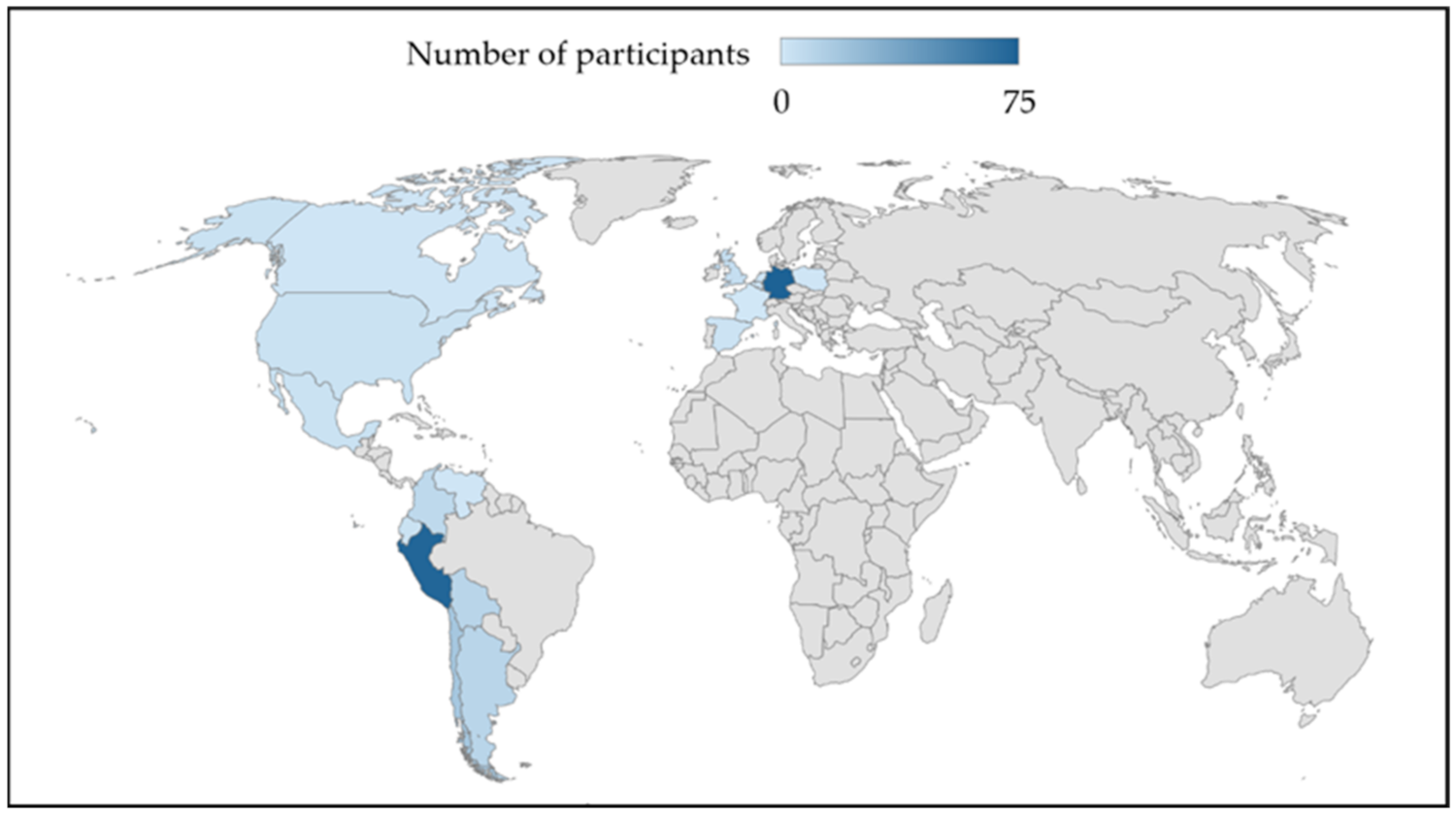
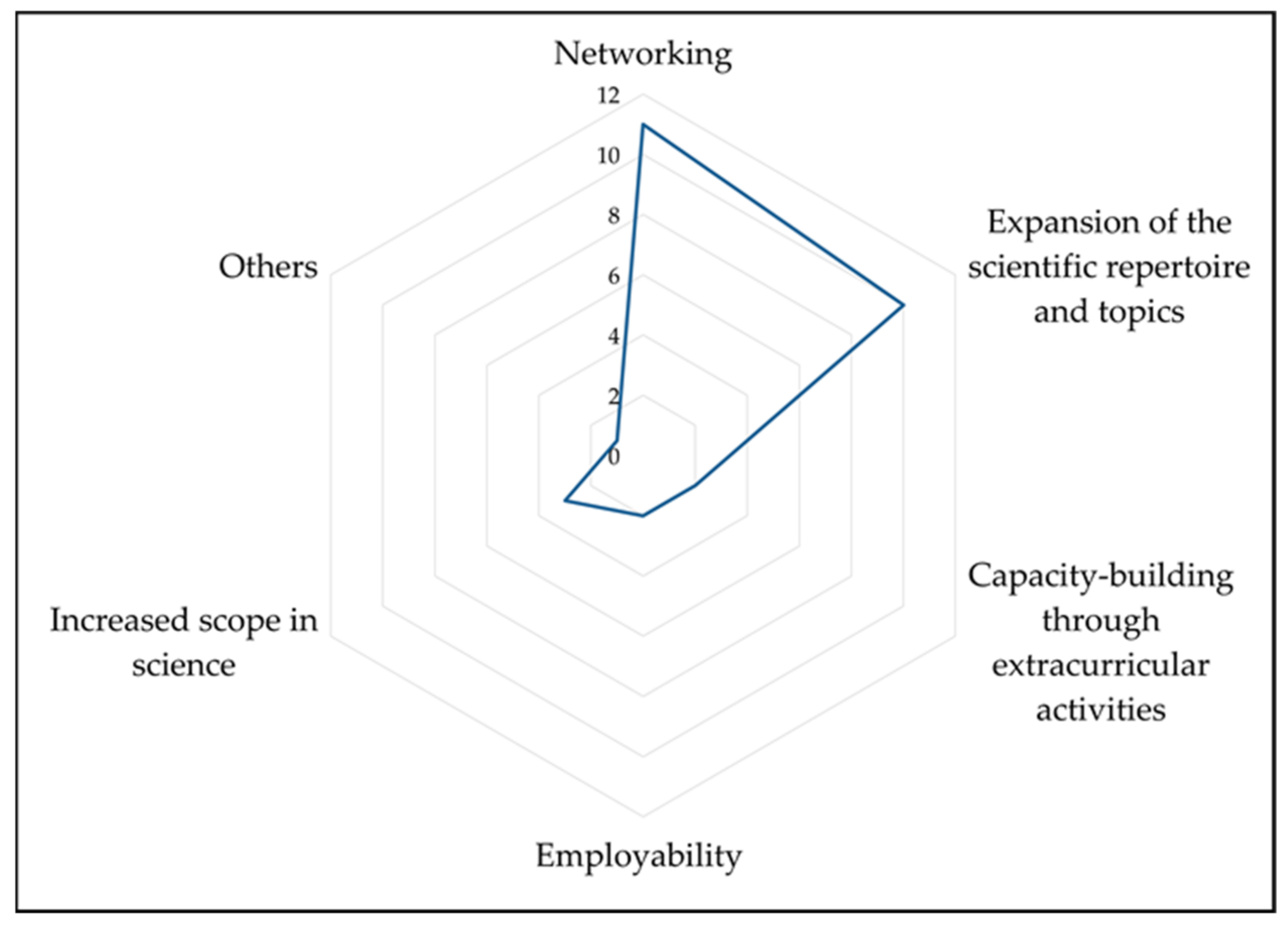
| UNSM, Peru | Universidad de San Antonio de Abad de Cusco, Peru | Universidad de San Martin, Peru | UMSA CIDES Bolivia | Universidad de Cuenca, Ecuador | ||
|---|---|---|---|---|---|---|
| Number of publications: | 125 | 105 | 48 (research projects) | 78 | 73 | |
| Language: | Spanish | 122 | 103 | 48 | 68 | 37 |
| English | 2 | 1 | 0 | 7 | 36 | |
| Portuguese | 1 | 1 | 0 | 2 | 0 | |
| Italian | 0 | 0 | 0 | 1 | 0 | |
| Spatial focus: | Local | 0 | 39 | 38 | 9 | 7 |
| Regional | 0 | 0 | 1 (Amazonia) | 0 | 0 | |
| National | 58 | 25 | 0 | 35 | 54 | |
| International | 26 | 16 | 0 | 23 | 9 | |
| Theoretical | 40 | 25 | 0 | 10 | 3 (and methods) | |
| Laboratory | 0 | 0 | 9 | 0 | 0 | |
| No data | 1 | 0 | 0 | 1 | 0 | |
| Publications: | Book ed. international | 9 | 0 | / | 7 | 11 |
| Book ed. university own | 20 | 0 | 22 | 6 | ||
| Books ed. others national | 0 | 0 | 16 | 4 | ||
| University own journals | 0 | 105 | 15 | 0 | ||
| Other national journals | 25 | 0 | 1 | 0 | ||
| External journal non peer review | 7 | 0 | 5 | 3 | ||
| International journal peer review | 4 | 0 | 8 | 41 | ||
| Grey literature | 48 | 0 | 4 | 7 | ||
| No data | 12 | 0 | 0 | 0 | ||
| Diffusion byuniversity (website): | Yes | No information on publications of individual researchers | Yes | |||
Publisher’s Note: MDPI stays neutral with regard to jurisdictional claims in published maps and institutional affiliations. |
© 2021 by the authors. Licensee MDPI, Basel, Switzerland. This article is an open access article distributed under the terms and conditions of the Creative Commons Attribution (CC BY) license (https://creativecommons.org/licenses/by/4.0/).
Share and Cite
Schorr, B.; Braig, M.; Fritz, B.; Schütt, B. The Global Knowledge Value Chain on Sustainability: Addressing Fragmentations through International Academic Partnerships. Sustainability 2021, 13, 9930. https://doi.org/10.3390/su13179930
Schorr B, Braig M, Fritz B, Schütt B. The Global Knowledge Value Chain on Sustainability: Addressing Fragmentations through International Academic Partnerships. Sustainability. 2021; 13(17):9930. https://doi.org/10.3390/su13179930
Chicago/Turabian StyleSchorr, Bettina, Marianne Braig, Barbara Fritz, and Brigitta Schütt. 2021. "The Global Knowledge Value Chain on Sustainability: Addressing Fragmentations through International Academic Partnerships" Sustainability 13, no. 17: 9930. https://doi.org/10.3390/su13179930
APA StyleSchorr, B., Braig, M., Fritz, B., & Schütt, B. (2021). The Global Knowledge Value Chain on Sustainability: Addressing Fragmentations through International Academic Partnerships. Sustainability, 13(17), 9930. https://doi.org/10.3390/su13179930







